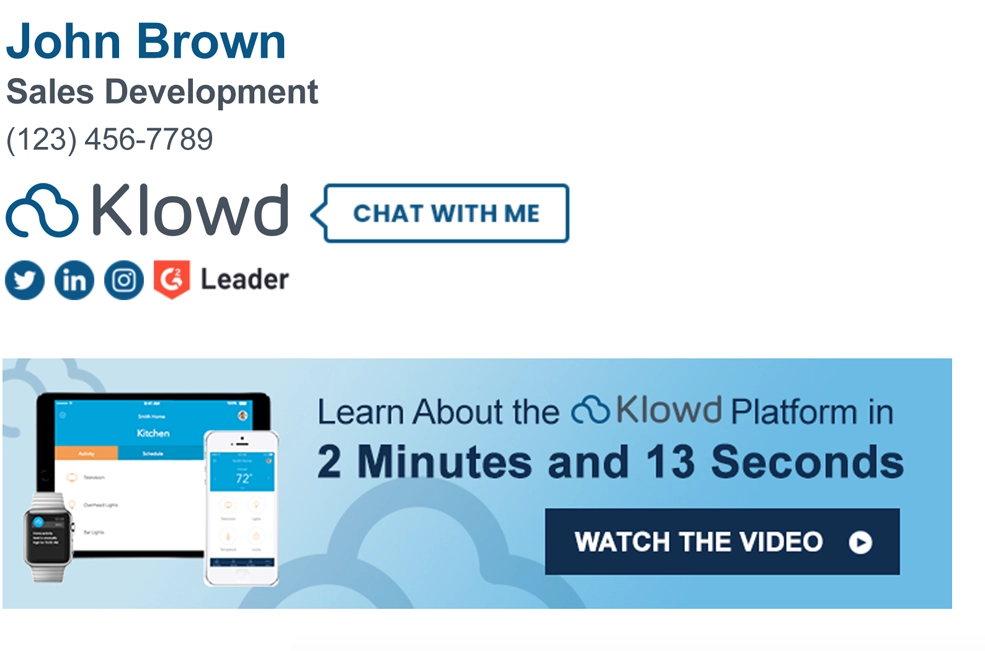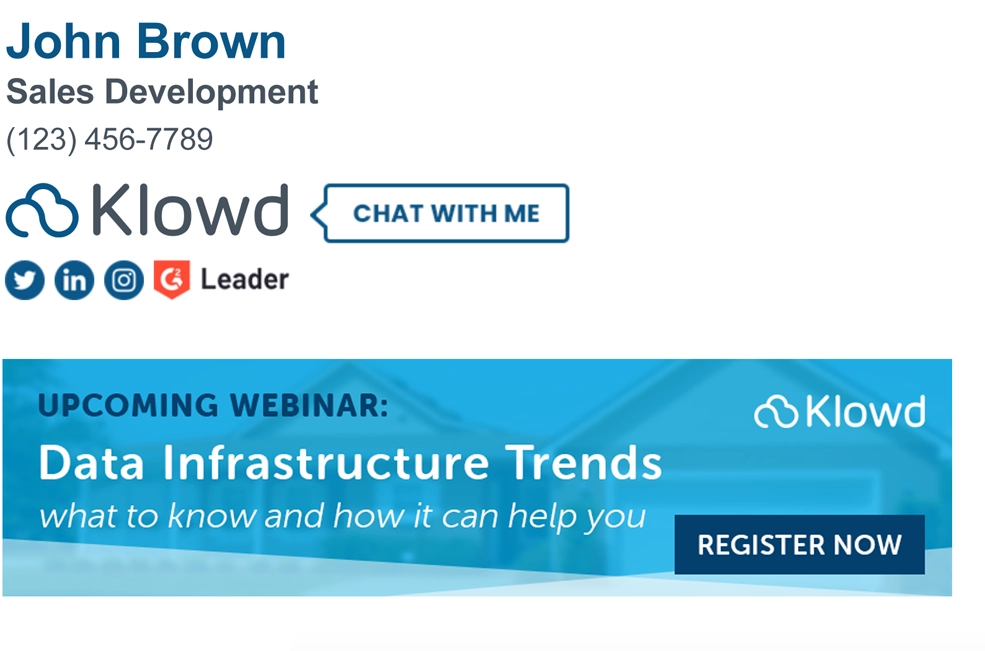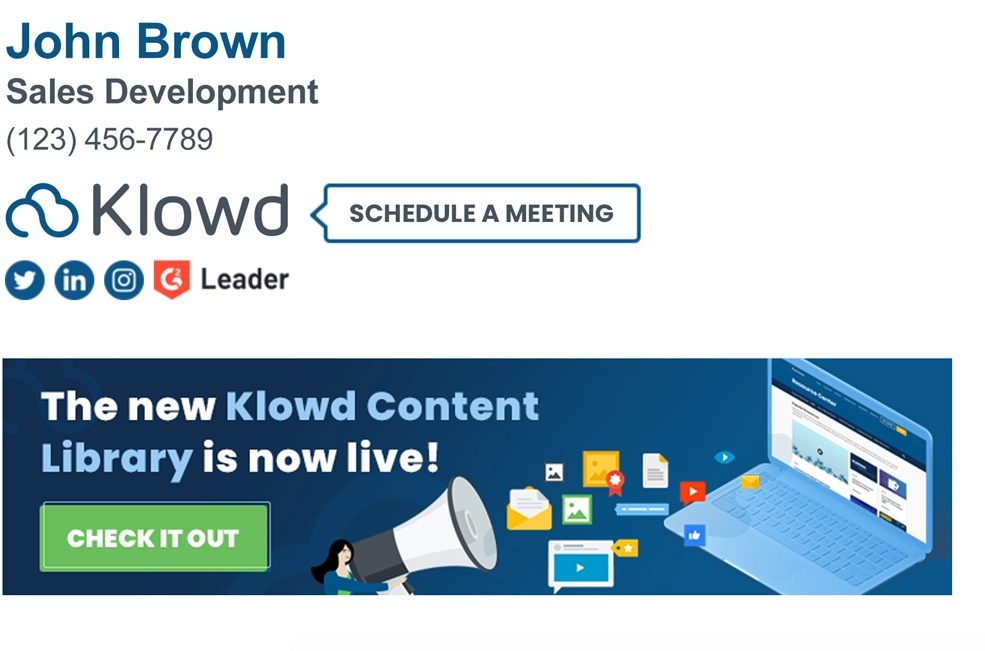Example Email #1: Introducing Yourself
You only get one shot to make that first impression, so you’ve got to do it right. Take a look at the example below:Subject Line (Test A): Go Cubs! Here are a few resources from Klowd. Subject Line (Test B): 3 cloud security resources for your team Hi Rachel, I thought I’d start this email with the important stuff first: Congrats to you and your Cubbies on the recent winning streak! John here from the Klowd team. As you start or continue your research on how cloud security can help protect your data and infrastructure from threats, I wanted to reach out, introduce myself, and pass along a few relevant resources that might provide some value. Resource #1: Cloud Security Setup 101 Resource #2: The State of Cloud Infrastructure and Data Security Resource #3: Klowd Product Overview Video I’m here as a resource if any questions come up during your evaluation process. Reach out any time or start a live chat by clicking on my email signature below. Thanks, and have a great day!

Let’s unpack what John did here: First, he offered up two unique, compelling, and very different subject lines to A/B test, which you can do with a platform like SalesLoft, Outreach, or your MAP. He can even do it manually in Gmail or Outlook, to see which garners a higher open rate. Next comes the personal comment about the Cubs. Emails are even easier to ignore if the recipient has even the slightest feeling that they’re on the other end of an impersonal mass email. Showing genuine interest will help your prospect feel more comfortable talking to you (and, hopefully, also buying). How did he know about her favorite baseball team? You’d be surprised what you can find out if you spend just a few minutes on their Twitter or any other social media profile. You’ll notice the mention of the prospect starting or continuing their research into this particular product. John knows this information because of the intent data he researched using a tool like Bombora, which easily integrates with Terminus. John listed three pieces of thoughtfully curated content based on what the prospect might have viewed or already downloaded (using the Terminus Measurement Studio is great for this). There’s no magic number here, but it’s best to keep it to a manageable quantity of related or similarly formatted content to give them more of what they want. Finally, John references the live chat option at the end of the note, which is easily accessible right in his email signature, thanks to Terminus’ Chat from Anywhere™ feature.
Example Email #2: Follow-up After Initial Engagement
Now, let’s move to the second email in John’s cadence.Hi Rachel, I couldn’t help but notice a few click notifications from my last email, so it seems like Klowd has maybe resonated with either you or a member of your team? To sum it up, our technology and services can help keep your cloud infrastructure protected. The Klowd platform includes cloud compliance and cloud data security, both of which might be priorities for your IT and engineering teams this quarter? If you have any questions about these features, any other features, or how we compare to other cloud security platforms, let me know how I can help. P.S. We have a webinar coming up that you might be interested in! Click the banner in my email signature for registration details. Thanks!

Right in the first sentence, John is acknowledging that Rachel clicked on one or more pieces of his previous email. He knows this by combining engagement data from his email platform of choice with email signature click data. Rachel might have clicked on a link inside the body copy of the email, a banner in the email signature, or any of the hot spots John laid out. John strategically pulled this data together to gauge her initial interest level. Next, and again using his organization’s ABM platform to pay close attention to Rachel’s website activity, John mentions two specific product features (in this made-up scenario, cloud compliance and cloud data security)because these were two pages of the Klowd website she had visited, which therefore indicates some sort of relevancy to her. Feeling a little…creepy? Don’t worry. Most internet users are all too familiar with their behaviors being tracked as they scroll through pages, and as long as you’ve been transparent with your practices throughout (which John has), you won’t send any bad vibes. Moving on, did you catch the part where John mentioned comparing Klowd to their competitors? Millions of buyers visit review sites like G2 every month to research B2B solutions. Terminus integrates directly with G2 to bring in this research intent data, allowing sellers like John to know when his target accounts are researching Klowd and Klowd’s competitors. The last line in this email offers Rachel yet another place to click, in the banner of the email. This, again, demonstrates that there’s no area too small to be used to engage your prospect.
Example Email #3: Book the Meeting
Now, let’s dissect the final email in the cadence – the one where John hopefully books the meeting with Rachel:Hi Rachel! Just following up from our chat conversation on the Klowd website. Thanks so much for visiting klowd.com and I’m glad you were able to attend the data infrastructure webinar. You mentioned the possibility of scheduling a meeting next week and including your teammate, Bill, on that call. Bill, nice to meet you! You and Mary Williams (my colleague on the Marketing team) sent a few emails back and forth earlier this year about data infrastructure resources, so it’s nice to reconnect and pick back up that initial conversation. Let me know a day and time that works best for the both of you next week. Or feel free to schedule some time on my calendar if that’s easiest. As a thank you for your time, enjoy your next lunch on Klowd! Keep an eye on your inbox from an UberEats gift card. Thank you for your interest and I look forward to learning more next week! Have a great day.

By using an engagement touchpoint from other channels—like chat, as John demonstrates in the first sentence—he’s able to offer a more personalized (and personal!) experience for Rachel in this final follow-up email. And nothing says “we’re organized and eager to impress you” like mentioning his colleague’s communications from months ago, which he was able to pull from relationship data within Terminus. John made it easy for Rachel to schedule a meeting by directing her right to a calendar scheduling tool, which allows them to avoid the “what day are you free” back-and-forth. Keep in mind, though, that some might like to schedule the old-school way—so it’s best to offer as many scheduling opportunities as possible. Now, for the thank you gift. You’re probably sitting there thinking how much of a pain it’ll be for John to manually send UberEats cards to every prospect. Luckily, with Sendoso and Terminus integration, John is able to send gifts to all his target accounts at once, and then measure the ROI on the campaign. Although John’s email cadence to Rachel looks, at first glance, like a fairly regular email campaign, you likely began to predict the areas where he was able to easily incorporate some sort of engagement opportunity. And each was unlike the one before it, giving his prospect multiple points where she could connect with John or interact with the Klowd brand. Once again, not a single pixel was wasted in any of these emails. What will your next email to a prospect look like? Source: https://www.business2community.com/email-marketing/the-elements-of-an-effective-prospecting-email-02419769

